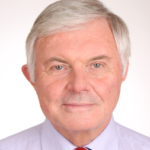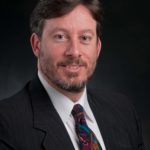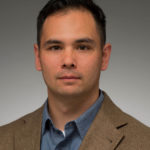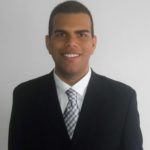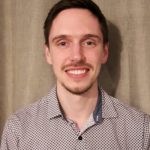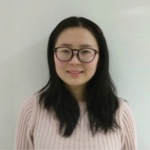2018 Award Winners
Each year the NPSS Awards Committee is tasked with selecting the recipients of our Society awards. They are for individuals who have shown outstanding dedication to the Society and who have made significant contributions to one or more of our fields. The younger award recipients show strong early contributions in their technical areas or great promise in making contributions along their career paths. I would like to thank all of you who participated in the 2018 awards process, especially the nominators, those who wrote support letters, and the NPSS Awards Committees.
Our congratulations to all of our 2018 awards recipients!
Dr. Manfred Thumm (SM’94-F’02) was born in Magdeburg, Germany. He received the Dipl.-Phys. and Dr. rer. nat. Degrees in Physics from University of Tübingen, Germany in 1972 and 1976, respectively. At the University of Tübingen, he was involved in the investigation of spin-dependent nuclear forces in inelastic neutron scattering. From 1972-1975 he was Doctoral Fellow of Studienstiftung des deutschen Volkes. In 1976 he joined the Institute for Plasma Research of University of Stuttgart, Germany where he worked on RF production and heating of toroidal pinch plasmas for thermonuclear fusion research. From 1982-1990 his research was devoted to electromagnetic theory and experiments in the areas of component development for transmission of high-power millimeter waves through oversized waveguides and of antenna structures for RF plasma heating with microwaves. In June 1990 he became a Full Professor at the Institute of Radio-Frequency Engineering and Electronics of University of Karlsruhe, Germany and Head of the Gyrotron Development and Microwave Technology Division, Institute for Technical Physics, Research Center Karlsruhe (FZK). From 1999-2011 he was the Director of the Institute for Pulsed Power and Microwave Technology, FZK. In October 2009, the University of Karlsruhe and FZK merged with the Karlsruhe Institute of Technology (KIT).
Dr. Thumm has authored/co-authored 6 books, 21 book chapters, and 373 papers in peer-refereed scientific journals, more than 1,470 conference proceedings articles, and holds 14 patents. His current research projects are the development and application of high power gyrotrons, dielectric vacuum windows, transmission lines and antennas for nuclear fusion plasma heating, and industrial material processing.
From 2007-2008 Dr. Thumm was Vice-Chair of FZK Scientific Technical Council and KIT Founding Senate. From 2008-2010 he was the Deputy Head of the Topic Fusion Technology of KIT. He was General Chair of the IRMMW-THz 2004 and IEEE ICOPS 2008 Conferences in Karlsruhe. He has been a member of international organization and advisory committees of many international conferences and a member of the editorial boards of several ISI refereed journals. From 2003-2010 he was Ombudsman for upholding good scientific practice at FZK/KIT. Since 2012 he has been the Editor for Vacuum Electron Devices of IEEE Trans. on Electron Devices, a Distinguished Lecturer of IEEE NPSS, and a KIT Distinguished Senior Fellow. Since 2016 he serves as a member of the Scientific Advisory Council of Leibniz Institute for Plasma Science and Technology Greifswald, Germany. He was a former member of the IEEE EDS Vacuum Devices Technical Committee and the NPSS PSAC Executive Committee.
Dr. Thumm was awarded the Kenneth-John-Button-Prize 2000. In 2002 he received the title of Honorary Doctor from the St. Petersburg Technical University. He received the IEEE-EDS 2008 IVEC Award for Excellence in Vacuum Electronics. In 2010 he was awarded the IEEE-NPSS Plasma Science and Applications Award. He was a winner of the 2010 open grant competition of the Government of the Russian Federation (Leading Scientist at Novosibirsk State University). Together with A. Litvak and K. Sakamoto, he was the recipient of the EPS Plasma Physics Innovation Prize 2011. In 2012 he was awarded with the Heinrich Hertz Prize of the EnBW Foundation and the KIT HECTOR School Teaching Award. In 2017 he received the Exceptional Service Award of the IRMMW-THz Society.
His citation for the 2018 NPSS Merit Award reads:
“For outstanding contributions and leadership in the field of electron cyclotron heating and current drive technology for thermonuclear fusion plasma research”
SHEA AWARD: John P. Verboncoeur
Dr. John Verboncoeur received a B.S. (1986) in Engineering Science from the University of Florida, M.S. (1987) and Ph.D. (1992) in Nuclear Engineering from the University of California-Berkeley (UCB), holding the US Department of Energy Magnetic Fusion Energy Technology Fellowship. After serving as a joint postdoctoral researcher at Lawrence Livermore National Laboratory and UCB in Electrical Engineering and Computer Science (EECS), he was appointed Associate Research Engineer in UCB-EECS and to the UCB Nuclear Engineering faculty in 2001, attaining full Professor in 2008. He served as the Chair of the Computational Engineering Science Program at UCB from 2001-2010. In 2011, he was appointed Professor of Electrical and Computer Engineering at Michigan State University and added an appointment as Professor of Computational Mathematics, Science, and Engineering in 2015. His teaching includes electromagnetics, plasma physics, neutronics, engineering analysis, and computation. His research interests are in theoretical and computational plasma physics with a broad range of applications spanning low temperature plasmas for lighting, thrusters and materials processing to hot plasmas for fusion, from ultra-cold plasmas to particle accelerators, from beams to pulsed power, from intense kinetic nonequilibrium plasmas to high power microwaves. He is the author/coauthor of the MSU (formerly Berkeley) suite of particle-in-cell Monte Carlo (PIC-MC) codes, including XPDP1 and XOOPIC, used by over 1,000 researchers worldwide with over 350 journal publications in the last decade. He has authored/coauthored about 400 journal articles and conference papers with about 4,000 citations and has taught 13 international workshops and mini-courses on plasma simulation. He is currently an Associate Editor for Physics of Plasmas and has served as a guest editor and/or frequent reviewer for IEEE Transactions on Plasma Science, IEEE Transactions on Electron Devices, and a number of other plasma and computational journals. He is Past President of the IEEE Nuclear and Plasma Sciences Society, a member of the IEEE TAB Management Committee, and IEEE Division IV Director-elect. Appointed Associate Dean for Research in the College of Engineering in 2014, he oversees college research activities and strategy. He has been involved in a number of technology startup companies, including development of one of the big three consumer credit reports, work on the hardware and software of the US Postal Service Mail Forwarding System, command and control software in the defense sector, computerized exercise equipment, and a pioneering cloud based health care management system. He is a fellow of the IEEE.
His citation for the 2018 NPSS Shea Award reads:
For outstanding contributions and leadership to IEEE NPSS as President, to IEEE Technical Activities for beginning and developing the Food Engineering/ Smart Ag Initiative, and to IEEE for leading an educational effort to retain our current constitution
EARLY ACHIEVEMENT AWARD: David B. Go
Dr. David Go is the Rooney Family Associate Professor of Engineering in the Department of Aerospace and Mechanical Engineering with a concurrent appointment in the Department of Chemical and Biomolecular Engineering at the University of Notre Dame. With a variety of diverse research interests, he has published widely in the areas of plasma science and gas discharges, heat transfer and fluid dynamics, and chemical analysis. To date, he has authored over 60 journal articles, over 100 conference papers and presentations, and multiple book chapters and holds three patents. A forthcoming book on the fundamental physics and chemistry in low-temperature gas discharges will be published as part of the IOP Concise Physics series in 2018. Dr. Go was recognized with the Air Force Office of Scientific Research Young Investigator Research Award in 2010, the National Science Foundation CAREER award in 2013, and as an inaugural winner of the Electrochemistry Society Toyota Young Investigator Fellowship in 2015. Prior to joining Notre Dame in 2008, Dr. Go received his B.S. in mechanical engineering from the University of Notre Dame, his M.S. in aerospace engineering from the University of Cincinnati, and his Ph.D. degree in mechanical engineering from Purdue University. He is a Fellow of the American Society of Mechanical Engineers and a member of the Institute of Electrical and Electronics Engineers, American Physical Society, Electrochemical Society, American Association for the Advancement of Science, and Electrostatics Society of America.
His citation for the 2018 NPSS Early Achievement Award reads:
“For contributions to the understanding of discharges and plasmas at microscale dimensions, the interaction between microdischarges and electron emission, and the nature of electron transfer at plasma-liquid interfaces”
CHARLES K. BIRDSALL AWARD: Bruce I. Cohen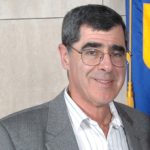
Dr. Bruce Cohen received a BS in physics with distinction and honors at Harvey Mudd College in 1970 and an MA in 1971 and PhD in 1975 both in physics at UC Berkeley (thesis advisor: A. N. Kaufman). He was awarded a National Science Foundation Graduate Fellowship and a Woodrow Wilson Fellowship in 1970. He was a post-doctoral researcher at the Princeton Plasma Physics Laboratory in 1975-1976. From August 1976 to retirement in January 2017, he worked as a physicist at the Lawrence Livermore National Laboratory. He was a group leader for Theory and Computations in the Fusion Energy Sciences Program at LLNL from 2007 to 2016 after being the deputy group leader from 1998 to 2016. He was elected an American Physical Society Fellow in the Division of Plasma Physics in 1987. He served as an associate editor for both the Journal of Computational Physics and Physical Review Letters. Dr. Cohen has served on numerous committees for the American Physical Society Division of Plasma Physics and the Department of Energy, Office of Science, Fusion Energy Sciences. His research has addressed plasma and computational physics topics in magnetic confinement fusion, laser fusion, space and astrophysical plasmas, radio-frequency heating of plasma, parametric instabilities, nonlinear beat-wave processes, linear and nonlinear theory of micro-instabilities, and turbulent transport, and the application and development of particle and fluid plasma simulation and multiple-time-scale computational methods. He has authored or co-authored over 160 refereed journal publications and chapters in two books.
His citation for the 2018 NPSS Charles K. Birdsall Award reads:
“For contributions to the numerical simulation of plasmas, particularly multiple time-scale methods, and to their application to diverse plasma physics problems from laser-plasma interactions to tokamaks”
GLENN F. KNOLL POST DOCTORAL EDUCATIONAL GRANT: Stefan Gundacker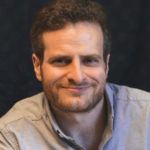
Dr. Stefan Gundacker was born in Zwettl, located in a region called “Waldviertel”, Austria. After completing a higher technical school with focus on telecommunication engineering in St.Pölten, he studied technical physics at the Vienna University of Technology receiving the degree of Master of Science (MSc) in 2010 with honors. He then started his doctoral studies at CERN constituting the beginning of his professional career in nuclear detector research with a strong focus on timing related aspects. His PhD work comprehensively described all the factors influencing the time resolution in scintillator-based detectors, from the ionizing radiation conversion in the scintillator, to the light production mechanism, the light transport in the crystal, the light conversion in the photodetector, and the readout electronics. In February 2014 he received the doctoral degree from the Vienna University of Technology with honors and continued his stay at CERN as a postdoctoral researcher. Since 2017 he is also associated with the University of Milano Bicocca as a postdoctoral researcher.
Dr. Gundacker’s current research interests are focused on the further understanding and development of ultrafast solid-state photodetectors and the detection of prompt photon sources such as Cherenkov radiation and the emission of quantum confined nano-crystals. He is working on applying this research of ultra-precise timing in the medical field, such as, positron emission tomography, actively contributing to the challenge of achieving a resolving time of about 10 ps equivalent to 1.5 mm along the line of response. He is further interested in the application of fast timing in high energy physics for future high luminosity accelerators in order to mitigate event pile-up.
GLENN F. KNOLL GRADUATE EDUCATIONAL GRANT: Negar Omidvari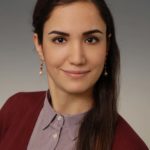
Negar Omidvari received the B.S. degree in Electrical Engineering from University of Tehran, Tehran, Iran in 2011. She earned the M.S degree in Biomedical Engineering from RWTH Aachen University, Aachen, Germany in 2013. She is currently working as a researcher at the Department of Nuclear Medicine in Klinikum rechts der Isar, toward obtaining the Ph.D. degree in Physics at Technical University of Munich, Munich, Germany. From 2012 to 2013, she was with Philips Research Aachen, where she was involved in the characterization of sensitivity-encoded silicon photomultipliers. Since 2014, her PhD research has been on development and characterization of a high-resolution small-animal positron emission tomography (PET) insert for a 7 T magnetic resonance imaging (MRI) scanner. The PET insert has a novel detector arrangement, with two offset layers of scintillation crystals individually read out by high-gain silicon photomultipliers (SiPMs), and offers high resolution, high count-rate capability, and reduced shielding requirements. She has worked on characterization of different scintillation crystal materials and SiPMs as detector modules for PET. She has also worked on Monte Carlo simulations of the scanner, characterization of data acquisition systems, data processing, image reconstruction, and the performance evaluation of the final system. Her latest work has been on MR-compatibility assessment of the PET insert with three radio-frequency coil configurations. She is a student member of IEEE and IEEE Nuclear and Plasma Sciences Society. She was a recipient of the Valentin T. Jordanov Radiation Instrumentation Travel Grant in 2017 and IEEE NSS/MIC Conference Trainee Grants in 2015 and 2017.
GRADUATE SCHOLARSHIP AWARDS:
Adrian Ildefonso has been awarded the 2018 IEEE Nuclear and Plasma Sciences Society (NPSS) Graduate Scholarship Award for his research contributions to the radiation effects community. Adrian received the B.S. degree in computer engineering from the University of Puerto Rico at Mayagüez in 2014 and the M.S. degree in electrical and computer engineering from Georgia Tech in 2017. He is currently a Ph.D. student in the Georgia Tech School of Electrical and Computer Engineering where he is advised by Pr. John Cressler, the Schlumberger Chair Professor in Electronics. He was awarded the US GEM Fellowship in 2014 and the US National Science Foundation (NSF) Graduate Research Fellowship in 2015. Adrian’s research focuses on studying the effects of ionizing radiation on electronic devices, particularly circuits and systems designed using silicon-germanium (SiGe) technologies. The primary goal of his work is to build more robust systems for space-based applications by identifying and implementing novel design strategies that improve the radiation tolerance of analog and RF circuits. This research has been supported by the Defense Threat Reduction Agency and the NSF and has resulted in 13 authored or co-authored peer-reviewed journal publications and four conference publications.
Francis Loignon-Houle has been awarded the 2018 IEEE Nuclear and Plasma Sciences Society (NPSS) Graduate Scholarship Award for his research contributions to the medical imaging community. He obtained his B.Sc. in Physics and his M.Sc. in Radiation Sciences and Biomedical Imaging at Université de Sherbrooke, QC, Canada. His M.Sc. work mainly focused on the optimization of light collection and extraction in scintillators for small-animal Positron Emission Tomography (PET) detectors, which led to the publication of three peer-reviewed journal papers and four oral presentations at international conferences, all as first author. He also co-authored two papers and several abstracts on detector developments for PET. He is currently pursuing a Ph.D. degree in Radiation Sciences and Biomedical Imaging at Université de Sherbrooke under the supervision of Pr. Roger Lecomte. His current research activities address the ultra-fast detection of radiation for time-of-flight PET with special emphasis on studying the effects of depth-of-interaction, Compton interactions, and prompt photons on time resolution. His work is supported in part by an Alexander Graham Bell Graduate Scholarship from the Natural Sciences and Engineering Research Council of Canada. Francis was awarded the Valentin T. Jordanov grant to attend the 2017 IEEE Nuclear Science Symposium (NSS) and Medical Imaging Conference (MIC).
Pan Wang has been awarded the 2018 IEEE Nuclear and Plasma Sciences Society (NPSS) Graduate Scholarship Award for her research contributions to the radiation effects community. She received the B.S. degree in Electrical Engineering from Huazhong University of Science and Technology, Wuhan, China in 2014 and the M.S. degree in Electrical Engineering from Vanderbilt University in 2017. She is currently pursuing the Ph.D. degree in Electrical Engineering at Vanderbilt University where she is advised by Pr. Dan Fleetwood. Her research interests include radiation effects and reliability of GaN-based HEMTs and two-dimensional materials and devices and low-frequency noise. She is the author or co-author of six journal articles that are published or accepted for publication and was a recipient of the Outstanding Conference Paper Award for the 2017 IEEE Nuclear and Space Radiation Effects Conference.
